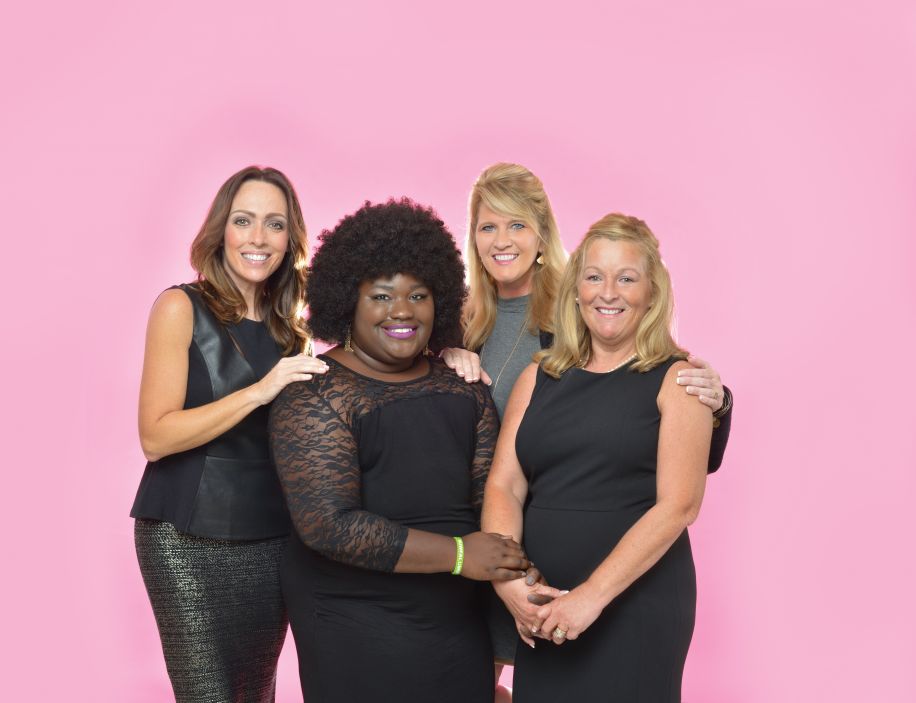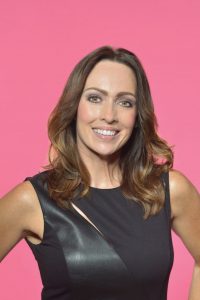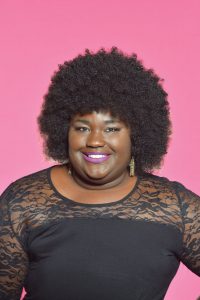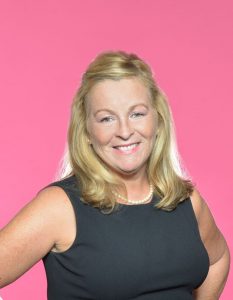By Kelly Oden
Stories Receiving the diagnosis from your physician is one of the most terrifying moments of a cancer survivor’s life. In that moment a million questions swirl through their minds and in the months that follow, all of those questions must be addressed and decided upon—treatment approaches, caretakers for themselves and their families, job stability, genetic testing, health insurance, finances and perhaps most unnerving—mortality. However, as one of our local survivors put it—breast cancer does not have to be a death sentence. Early detection and advancement in treatment options are keys to a good outcome.
In honor of Breast Cancer Awareness Month, we’ve asked four remarkable, strong women to share their stories about their complex emotional and physical journeys with breast cancer and the choices they made to ultimately defeat the disease. For some, opening up about their journey is second nature and for others it can be an emotional task, but it is so important to spread the word about early detection, treatment and surviving this disease that is the second-leading cancer killer of women in the United States. In 2017, The American Cancer Society estimates there will be 1,688,780 new cancer cases diagnosed and 600,920 cancer deaths in the US. We hope these stories inspire you to be proactive about your own breast health—learn about your family cancer history, be vigilant in your breast examinations, and if necessary, consider getting the genetic testing to help you see the bigger picture and make decisions that are best for you. Andrea, Angela, Mikia, and Teri—thank you for sharing your stories with us!
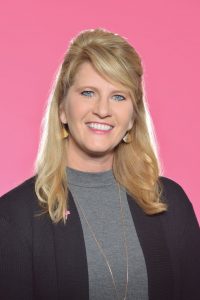
Could you give a brief introduction for our readers about you, your family, and your interests and hobbies?
Our family moved to Pensacola from San Diego in December of 2005. We love, love, love this community and cannot imagine life anywhere else. I enjoying biking, hiking with the dogs at UWF, as much beach time as we can possibly get (seriously BEST beaches EVER) concerts, time away at Lake Martin and cooking and baking for my family – nothing makes me happier than making all my loves their favorite dishes. I have been a volunteer and proud supporter of Making Strides against Breast Cancer since 2008 and a member of IMPACT 100 since 2010. We are members of Marcus Pointe Baptist Church. I have worked in mortgage for nearly 30 years, a voice talent for about 20 years and have been the shadow voice on Cat Country/NewsRadio for about 10 years.
When were you diagnosed and at what age?
I received my diagnosis in October of 2016 at the age of 49.
What stage and type of breast cancer were you diagnosed with?
Stage 2 invasive ductal carcinoma. Estrogen and progesterone positive and HER-2 negative.
How was the cancer initially detected?
I had my regular annual mammogram on September 28, 2016. The next day I received a call advising that something warranted further review and that I needed an additional appointment for ultrasound. I had the ultrasound on my birthday. I knew they were concerned by what the images showed — you can feel it, and sure enough the ultrasound detected two tumors, which then lead to a biopsy and confirmation that I had cancer. Just a few days later a breast MRI would show that I actually had four tumors, my oncologist would tell me that I was a puzzle and definitely full of surprises!
How did you feel when you first received the news?
Somehow, I was not surprised by the phone call that my mammogram was abnormal. I felt as though God had been preparing me for this fight my whole life. I was not scared, not even really worried. I remember thinking everything through in much detail before sharing the news with my family, and I vowed to myself that whatever I faced I would not let it affect their daily lives, that I would still love and care and make their every day the very best that it could be. I knew whatever the outcome of the tests and diagnosis that I would use my experience to assist others facing this battle.
Is there a family history of breast cancer? If so, were you aware of it before diagnosis?
At the age of just seven my grandmother, Dorothy, on my father’s side lost her battle with breast cancer. At such a young age I did not fully understand her illness or her battle but I will tell you it had a very deep impact on me and I still remember crying and crying for days. She lived on a farm in Iowa and I admired and looked up to her so very much—she was the strongest woman, physically and emotionally. I remember feeling so sad that she was taken and for all that we would miss together over the years. I believe I carried the feeling of loss and helplessness with me and it lead to my interest in joining Making Strides Against Breast Cancer. I wanted to be an advocate for those fighting their battles and to raise awareness for early detection by encouraging woman to not put their health aside but treat as a priority. As woman, we tend to put the needs of others before ourselves, we tend to our homes, our families, our careers before taking care of ourselves. But if we do not set the time aside to ensure our health if can make the battle harder on us and our family. My mother’s sister is a survivor as well, I was able just a few short years ago to watch her triumph over her diagnosis.
Did you choose to get tested for the BRCA gene?
This test was recommended for me as I have a history of breast cancer on both sides of my family and I am a mother of two amazing woman. We wanted to know what they may face as well.
Did you have a support network? If so, who has been your biggest supporter? If not, how did you overcome it or find support?
I am the “do-er” of the household. It is my mission to ensure everybody has everything they need and have the very best of days, each and every day. Having to rely on others is super hard for me. My husband Brent will be the first to tell you that I am a hard-headed woman, but my family stepped up in ways that warm my heart to reflect upon. The outpouring that came from the Cat Country family, MSABC, Marcus Pointe Baptist Church, fellow IMPACT100 members, our neighbors, the Student Leadership Team at Ransom Middle School, realtors and so, so, so many amazing community members made my recovery easier. My doctors and nurses went above and beyond for me and became family. Dr. Sunnenberg, Dr. Caluda, Dr. Butler and Dr. Medlock saw to so many details I did not ever have to think about. I was in Dr. Butler’s office for dozens of visits and their concern for my comfort was unbelievable.
Tell me about your treatment process.
My husband does not really know this about the process, but I knew almost immediately that a full mastectomy would most likely be how I would choose to proceed. Of course initially when there were just two tumors it was discussed that a lumpectomy would be a successful treatment, but I was very cautious to get too used to the idea until we knew the results of all the tests. Upon confirmation that I had four tumors, although only affecting one breast, I had no problem making the decision to remove both breasts. If I was going to have surgery it was of the absolute utmost importance to me that I only fight this battle once. I did not ever want to put my family or friends through the process again. I am young and healthy and felt facing this head on, aggressively would produce the best outcome. Just 60 days after my mastectomy I was back in the OR with my ob/gyn to remove my ovaries and fallopian tubes. This was done not only due to the type of cancer I had, but also due to the fact that I would spend five to ten years on the drug Tamoxifen.
Were there any programs or services offered to you that would help with the treatment process?
I was blessed to be provided by friends a few items that were of absolute necessity to my recovery – a breast cancer pillow, shirts with special pockets to keep the drainage tubes secure following surgery and a seat belt pillow. These items were all vital in my comfort.
Did you face any obstacles during your treatment process? If so, how did you overcome these obstacles?
Following what was to have been my final surgery, when the expanders had been removed and the implants placed – I developed an infection in the skin of my left breast. It was a really big setback. For one month I was on heavy medications, stayed away from the public and we watched with great expectation for healing that would never come. My husband was amazing, he had to change my dressing and apply treatment to the area daily. I know that it was very difficult to see and not be able to make it all better, but he was a rock. Ultimately, my surgeon had to take me back into surgery and remove the implant, repair the damaged skin and place another expander in my chest while I healed back up.
What message would you like to provide women in the community?
I would hope that all women choose to make their health a priority. Early detection is absolutely 100 percent vital. Yes, the diagnosis is overwhelming. Yes, the treatment may be difficult, but knowing your enemy, preparing for battle and facing it head on will ensure that you will be around to experience all of the wonderful moments and memories life has to offer for a very long time.
Could you give a brief introduction for our readers about you, your family, and your interests and hobbies?
I am Andrea Farrell, local sales manager at WEAR and founder of Blush Life Apparel. I have one son, Luke, who is 6 years old. I love yoga, Pure Barre, running and the beach. The most important thing for me is spending time with my family and my friends, laughing and making memories.
When were you diagnosed and at what age?
I was diagnosed with Stage II Infiltrating Ductile Carcinoma when I was 36 years old on January 4, 2012. I was also told that I had the BRCA 1 mutation and later discovered that I was Triple Negative. A diagnosis of triple negative breast cancer means that the three most common types of receptors known to fuel most breast cancer growth—estrogen, progesterone, and the HER-2/neu gene—are not present in the cancer tumor.
How was the cancer initially detected?
Our son was only three months old when I found a lump on my right side after I stopped nursing. I always had breast exams during my annual appointments with my OB; however, this is thought to have developed in a short amount of time between those appointments.
How did you feel when you first received the news?
Fear is one of the first things that came to my mind, only because the word “cancer” can be terrifying. At that point, you don’t know what stage your cancer is. You don’t have a treatment plan. All you know is that “you have cancer.” That alone can be frightening.
Is there a family history of breast cancer? If so, were you aware of it before diagnosis?
Yes, my maternal grandmother was diagnosed with breast cancer before the age of 50 and underwent a radical mastectomy, which is a procedure involving the removal of the breast, underlying chest muscle, and lymph nodes. I was never informed of BRCA testing and I always checked the box that cancer ran in my family but no one ever talked to me about getting a genetic test. At the time, I trusted the advice of my physician and had annual exams. One of the things I talk to people about now is the importance of knowing your medical history and know your options on how to navigate your future based on that history.
Did you choose to get tested for the BRCA gene?
After I was diagnosed with Stage II Breast Cancer, I had the test and it did come back positive for the BRCA 1 mutation. This also means that my son has a 50/50 chance of having the BRCA mutation as well.
Did you have a support network? If so, who has been your biggest supporter?
I had a huge support network from my husband, my family, friends, workout partners and trainer, co-workers, church group, my former teammates and the entire Colts organization as well as many others. I truly am blessed to have been surrounded by so many people that showed me an outpouring of love and compassion. There are so many wonderful organizations and resources available for all that are going through this journey.
Tell me about your treatment process.
I endured four months of an aggressive chemotherapy regiment that consisted of Adriamycin, Cytoxan and Taxol / Taxotere. Every Saturday, following my Friday Chemotherapy appointment, I would go in for a Neulasta shot. Neulasta is a colony-stimulating factor, a man-made form of a protein that stimulates the growth of white blood cells, used to decrease infection, by treating a lack of certain white blood cells caused by receiving chemotherapy. Upon completion, I underwent a bilateral mastectomy followed by immediate reconstructive surgery. That process includes expanders that are placed under the chest muscle and over the course of several months, the plastic surgeon fills the expanders to stretch the muscle away from the chest. After four months of expansion, I was able to finalize my surgery with implants. Because I carry the BRCA 1 mutation, I opted to have a full hysterectomy last year.
Were there any programs or services offered to you that would help with the treatment process?
There are many programs available, but personally, I leaned on the experience of my physicians, family and friends.
Are there any assumptions or misconceptions about breast cancer that you would like to shed some light on?
Yes. I found that people automatically assume the worst-case scenario for you after being diagnosed. I was asked questions such as “how long have they given you?” “Are you going to blow up from the steroids they give you?” “Are you going to shrivel away to nothing because you will be so sick from treatment?” I also had people feel sorry for me because they felt I would be traumatized from having a mastectomy. The reality is that it’s 2017. There are many different treatment plans and plastic surgery and prosthetics have come along way. I never got sick after a chemo treatment. I worked out the entire time—even after my surgeries. I only missed work on my chemo days or due to surgery. I wore wigs every single day. I had my eyebrows tattooed and to look at me, you would have never guessed what I was going through. Each person’s path is different so never assume what happened to or with one person will happen with another.
Did you face any obstacles during your treatment process? If so, how did you overcome these obstacles?
After having a PET-CT scan, there were some questionable areas between my lungs. My oncologist sent me into immediate surgery to do a biopsy on those lymph nodes between my lungs. I asked her before the surgery what it meant if those areas came back positive for cancer as it related to my breast cancer and she told me that it would move me from Stage II to Stage IV. That was one of a few times I was truly moved to tears. Fortunately, they were negative and my plan remained the same.
Losing everything that is associated with being feminine was a mental challenge for me. I even lost my fingernails and toenails toward the end on my Taxol / Taxotere treatment. Through that process the one thing that I could control was my attitude so I remained strong and knew that I could beat this and the “surface” things that bothered me were just little bumps in the road in the journey of me finding my new normal.
Also, through my reconstructive process I couldn’t find a garment that worked with my ever-changing body, therefore I created a post-surgical bra that is infused with SeaCell technology, utilizing seaweed to aide in the body’s healing process. It’s also a nursing bra, yoga bra or an option for any type of chest surgery. You can learn more about that at blushlifeapparel.com.
What message would you like to provide women in the community?
Know your medical history and be your own healthcare advocate. I encourage everyone to do self-breast exams, have an annual mammogram, and maintain a healthy lifestyle. The word fear has two meanings—forget everything and run or face everything and rise—the choice is yours. Personally, life in its purest and simplest form is what cancer has given to me. I enjoy the little things like a rainy day or a smile from my son. I maximize each day to the fullest and look for my purpose through all of it.
Could you give a brief introduction for our readers about you, your family, and your interests and hobbies?
I am originally from Oxford, Ala. I moved to Pensacola in August of 2012 to pursue my master’s degree. After completing my degree in 2014, I was hired on full-time at the University of West Florida where I now serve as the Take Stock Collegiate Scholars Program Coordinator for the Division of Academic Engagement.
When were you diagnosed and at what age?
I was diagnosed with breast cancer in 2014 at the young age of 24.
What stage and type of breast cancer were you diagnosed with?
I was diagnosed with stage 2a breast cancer. The type was triple negative invasive carcinosarcoma breast cancer.
How was the cancer initially detected?
In March of 2014, I felt a lump in my right breast. At that time I would say it was about 1cm. I tried to WebMD myself and put off going to the Dr. I had started a healthy lifestyle regimen and just figured my body was reacting to it. As months passed by, the lump began to grow, itch and flutter every now and then. In September of 2014 I decided to have it checked. I went to a gynecologist who said that the lump was probably just a fibroadenoma. He then sent me to a surgical oncologist who performed an ultrasound and also diagnosed it as a fibroadenoma. I had the lump removed on September 26. On October 8 I went back to the Dr. to check on the healing from the surgery. Once I entered the room the doctor walked in and said that he had bad news.
How did you feel when you first received the news?
Deep down inside it was all a gut wrenching experience. To this day I still have a blurred remembrance of what was said. Once I got in the car, I cried and then gathered my thoughts so that I could make the calls to my family. I live in Florida, they are in Alabama. It hurt more having to inform my family of the news, because cancer runs so deep in my family. I know that I was thinking the worst and they might think the worst as well.
Did you choose to get tested for the BRCA gene?
I don’t recall having a choice to be tested. Once my doctors found out what type of cancer I had, they went into full force with testing me for everything and sending me everywhere! On November 4, my doctor called and asked me to come back in to talk before going in for a lymph node procedure to see if the cancer had spread. Once I arrived to the doctor’s office on November 5, my doctor urged me to go ahead with a double mastectomy. I laid on the table and cried. I don’t know if it was because I was back in the same room from the diagnosis, because my mom was finally in Florida with me, or because I would be losing my twins in the next 30 hours. I asked my doctor if I could have a moment to think about the next steps. He and his nurse stepped out. We prayed and then a peace washed over me. I told my doctor that we could proceed tomorrow with a double mastectomy and inserting a power port.
Did you have a support network? If so, who has been your biggest supporter? If not, how did you overcome it or find support?
My co-workers at UWF, my family and church family. My support system reached miles away! The office I worked for at the time drafted a schedule of meals to be brought to my home and created a schedule of folks to accompany me to my treatments. I was never without someone at my 16 chemo treatments. For the final treatment in July of 2015, I had 17 companions to accompany me!
Tell me about your treatment process.
I had 16 rounds of chemotherapy, 12 weekly sessions and then 4 sessions that were every three weeks that were a lot more intense. Since my tumor had grown to 5 centimeters, I then had to have radiation. I made it through 29 radiation treatments before being sent to the hospital for 10 days to heal from severe radiation burns. There was literally no skin left to radiate. I then went for 40 hyperbaric chamber treatments to speed up healing from the burn. I would go daily for two hours.
Did you face any obstacles during your treatment process? If so, how did you overcome these obstacles?
The double mastectomy has left me with little feeling in my right side of my upper arm and chest. Chemo caused quite a bit of fatigue. Some rounds were better than others. I lost all of my hair, my nails turned black and begin to come off the nailbeds, my tongue was black, my teeth are not as strong as they were and I still have issues remembering things. Radiation brought severe burns, but they have since then healed really well. All and all I am eternally grateful for my diligent doctors and nurses who took care of me! Leaning on my family and friends and knowing that “this too shall pass” got me through every ache and pain.
Are there any assumptions or misconceptions about breast cancer that you would like to shed some light on?
You are never too young to get breast cancer! When you feel something, go right away to get checked. It may save you more than a year of treatments!
What message would you like to provide women in the community?
“Keep fighting it with faith.” With the strength of God and the love of family and friends it is possible to get through the battle of breast cancer with a smile!
By Teri Lowe, wife of JC Lowe and mother of Breonna and Sam Lowe.
It was November 2001, I was in the Jacuzzi when I noticed a lump in my breast on my left side. It was soft but it was definitely there. I immediately went into panic mode. I called my primary care doctor who got me in the next day. After examining me, he said because it felt soft that it was probably nothing to be concerned about. However, he wanted me to have a mammogram.
All along in my mind I knew it was cancer. My mother had breast cancer at the age of 46. My husband and I went to the imagery center to have my first mammogram and I knew when they came back in and said they needed to do a ultrasound that my fears may become reality. They completed the ultrasound and asked us to wait. Then came the words ” We are 98 percent sure that this is cancer.” I was numb.
I was 36 years old with two young children at home and a husband with a bright future in broadcasting. This can’t be happening to me. What do we do? Who do we see? We were living in Austin, Texas at the time and our family all lived in Oklahoma. I knew nothing about oncology.
So, back at home we decided to tell the children—not knowing how they would process this or if they could understand. Breonna was 14 and Sam was 6. We told them and they really didn’t get it, but the strange thing was that our daughter came downstairs and sat next to me and said, “Momma don’t worry. My friend Katy’s mom had breast cancer and she is just fine!” I had never heard her talk about a Katy and I knew all of her friends. About an hour later she asked if Katy could spend the night and I said sure. Katy and her mom came over and I started to ask her mother about her breast cancer. She said, “I’ve never had breast cancer…I run an oncology center!” I asked my daughter, “I thought you said Katy’s mom had breast cancer?” She said, “Yeah that is another Katy.” Divine intervention—one ‘Katy’s mom’ helped me get in to see Dr. Stansberry—my oncologist/cosmetologist as I later referred to him. Then I had another ‘Katy’s mom’ who I could talk to about her experience and what to expect.
Later, Dr. Stansberry confirmed through a biopsy that it was a stage II ductal carcinoma—that news came on Christmas Eve 2001. I had to make a decision—do I totally remove my breast or to try to remove just the tumor with lumpectomy? I eventually choose the lumpectomy. I wondered if I had made the right decision throughout the process.
Then our tribes rallied. My father who had survived colon cancer twice came to talk to the doctors (oncologist and surgeons). My brother came with my stepdad and for support, they both completely shaved their heads! My mom came and helped with the children and when she had to go, the next round of family and friends came to help. I was so blessed with the support I had from family, friends and neighbors. My rock though was my amazing husband, Jay! He was there for me 100 percent even though he was afraid, too. He never showed me that—he was strong and positive and I had times that I didn’t think I could take another treatment of chemo and he made me see that I had to keep fighting. People need to realize that your spouse or significant other needs support, too. Through my six rounds of the strongest chemo out there (Adriamycin / Cytoxan), he was strong for me and our children.
Radiation came later with the brilliant Doctor Nuich. I saw him five days a week for several weeks. This was a man who so badly wanted a cure for breast cancer! We would some days have long conversations about the demographics of the women who had breast cancer. He would find areas in the U.S. where the numbers were higher than others. He was so interesting to talk to. I don’t know if that was what he did with all his patients but it certainly made going there every day interesting.
During my treatment I reached out to all of the women I am related to and told them all to go get a mammogram as it could be genetic. Then I received a call from my sweet Aunt Barbara and they found cancer in her breast, too. We both went through radiation at the same time.
This is the first time I have spoken publicly about my breast cancer. It was something I wanted to put behind me as if it never happened to me and my family, but the truth is that it did. I am almost 16 years cancer free! I am alive! My mother is alive and 26 years cancer free! And Aunt Barbara is alive 16 years cancer free!
I’m telling my story today to give hope.
Cancer does not have to be a death sentence!
